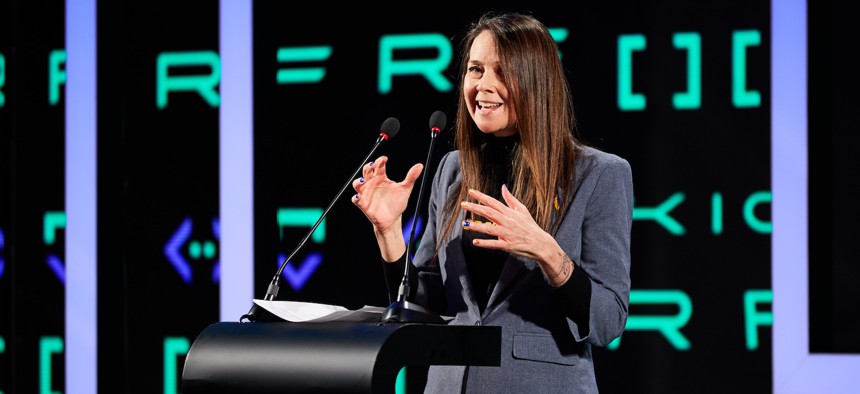Congress expected to approve government spending bill that cuts CISA funding

CISA Director Jen Easterly, shown here at the Kyiv International Cyber Resilience Forum 2024 on February 7, 2024 in Kyiv, Ukraine, will likely finish out fiscal 2024 with budget cuts. hurricanehank/Global Images Ukraine via Getty Images
The agency has previously stressed that funding will be needed to combat cyber threats and coordinate with partners as the November presidential election approaches.
Congress is likely to greenlight a $1.2 trillion fiscal 2024 spending package that would cut funding for DHS’s Cybersecurity and Infrastructure Security Agency.
The agency would be granted $2.8 billion under the deal that was released Thursday, around $35 million less than what was provided in the prior fiscal year. For FY2025, some $3.15 billion is requested for DHS cyber funds, up from around $3 billion that was requested for fiscal 2024.
The spending bill moved through the House in a 286-134 vote on Friday and will have to be taken up by the Senate before midnight to prevent a partial funding lapse, making it likely for the high chamber to approve the package without significant changes.
CISA has emphasized that funding is crucial for its operations as it works with the intelligence community and other partners to combat nation-state cyber threats and hacking campaigns from cybercriminals in a presidential election year.
But growing GOP backlash over allegations of CISA working with tech platforms to censor conservative voices has led some lawmakers to outright stop measures that would empower the cyber agency.
Fraudulent claims about the results of the 2020 election made CISA a major target for some right-leaning voices that viewed the agency as trying to silence their views. On the heels of the election, then-President Donald Trump fired Chris Krebs as CISA director, citing Krebs' comments characterizing the 2020 vote as, "the most secure in American history."
Ongoing pressure from conservative critics, for instance, has led to some participants' decisions to pull out of a CISA-led information sharing initiative, Politico reported last month.
The agency in early March said it had not been in touch with social media firms about coordinating on election security. The radio silence is linked to a pending Supreme Court case that contemplates whether Biden administration agencies have the ability to stay in contact with social platforms about removing posts that might contain disinformation.
The litigation, Murthy v. Missouri, was fueled by allegations that agencies like CISA were unfairly pressing for the removal of content related to election results and vaccine safety.
Recent oral arguments have signaled Supreme Court justices are hesitant to impose restrictions on such communications. The FBI quietly resumed contact with social media about foreign disinformation campaigns, NBC News reported Wednesday.
Officials and researchers fear that consumer-facing AI tools or similar offerings available on the dark web will supercharge hackers’ attempts to breach election infrastructure or craft realistic-sounding voices that seek to sway voters away from the polls or instill distrust in election outcomes, propelling a federal push to stay on top of such cyber and disinformation threats as November approaches.






